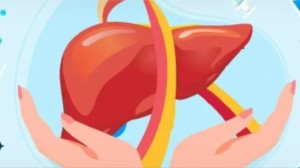文章来源:医学界消化肝病频道
核苷酸类似物可使HBV相关HCC患者根治性切除术后复发率更低,延长患者DFS和OS!
肝细胞癌(HCC)是世界上最常见的癌症相关死亡原因之一,发病率较高[1],其中中国患者占50%以上[2]。
肝移植、肝切除、射频消融等根治性疗法可改善HCC患者的预后。随着手术技术和围手术期管理的进步,根治性治疗后的5年生存率已达50%[3],但根治性治疗后的肿瘤复发率仍然很高,5年复发率大于70%[4]。遗憾的是,到目前为止,尚无有效的术后治疗方法来预防HCC复发。
乙型肝炎病毒(HBV)感染者发生HCC的危险性增加[5]。最近的研究也表明,HCC根治性治疗后肿瘤复发率随HBV DNA和丙氨酸氨基转移酶(ALT)水平的升高而增加[6]。
已经有多个大队列研究证实,在根治性治疗的同时进行抗病毒治疗可减少HCC的复发,提高总生存率[7-10],但在降低HBV相关的HCC根治性治疗后复发方面,哪种口服抗病毒治疗方案是最佳选择,目前尚无共识。
本文将系统地回顾近两年来这个领域的重要研究数据,并探讨背后的可能机制。
2018年济宁第一人民医院李辉团队回顾性比较分析了233例慢性乙型肝炎(CHB)相关HCC患者肝切除术后无病生存期(DFS)和总生存期(OS)[11],发现核苷酸类似物富马酸替诺福韦酯(TDF)治疗组的DFS显著长于核苷类似物恩替卡韦(ETV)(P<0.05)。而且,TDF与更好的无疾病生存独立相关(HR 0.35;95% CI 0.33–0.84,P<0.05)。

图1:TDF与ETV的DFS比较
同样地,在今年4月份,韩国蔚山大学医学院Young-Suk Lim领衔的团队,研究了HBV相关HCC的根治性意向肝切除术后接受ETV(n=813)或TDF(n=882)治疗的患者数据[12]。
在ETV或TDF治疗的中位随访时间37.6个月期间,他们也发现:经多变量调整分析后,TDF治疗与更高的无复发生存率(P=0.02)、更高的总生存率(P=0.03)相关。

图2:ETV或TDF治疗患者的无复发率和OS比较
四川大学华西医院文天夫团队,针对核苷酸与核苷类似物对HBV相关HCC根治性切除术预后的不同影响进行了一系列研究[13-15]。总的来说,无论是DFS,还是OS,核苷酸类似物都显著优于核苷类似物。而且,核苷酸类似物的使用与肝硬化患者、HBeAg阴性患者、HBV DNA阳性患者的DFS和OS的增加显著相关。
具体来看,核苷酸类似物(如ADV)组的1年、3年、5年、7年和9年OS率分别为96.3%、84.9%、77.5%、67.2%和63.5%,核苷类似物(例如LAM、ETV)组的1年、3年、5年、7年和9年OS率分别为93.4%、77.2%、58.5%、40.8%和37.7%(P=0.004)[14]。
核苷酸类似物(如ADV)组的1年、3年、5年、7年和9年DFS率分别为83.6%、66.0%、50.4%、34.4%和34.4%;核苷类似物(例如LAM、ETV)组的1年、3年、5年、7年和9年,DFS率分别为76.6%、54.1%、37.0%、26.6%和19.9%(P=0.028)[14]。

图3:ADV与LAM/ETV治疗患者的OS和DFS比较
今年8月份,青岛第六人民医院苟卫团队研究了479例根治肝切除术后的CHB相关HCC患者数据[16],他们发现采用TDF治疗的患者OS明显长于采用其他方案(LAM、LdT或ETV)的患者(P=0.015)。与非TDF治疗的患者相比,采用TDF治疗的患者DFS更长(P=0.042)。
 图4:以上6个研究结果的汇总
图4:以上6个研究结果的汇总
基于以上证据不难看出:在HBV相关的HCC患者根治性治疗后,与核苷类药物相比,核苷酸类药物在DFS、OS和控制复发方面更优。
那么核苷酸类似物为什么优于核苷类似物呢?
就在2018年,日本National Center for Global Health and Medicine的Kazumoto Murata团队采用高灵敏度方法,对254例处于不同临床阶段的HBV患者进行血清IFN-λ3水平测定[17]。
他们发现,与核苷类药物(LAM或ETV)治疗的患者相比,使用核苷酸类药物(ADV或TDF)治疗的患者血清IFN-λ3水平更高。而且细胞研究发现,ADV的使用与干扰素刺激基因(ISGs)表达上调显著相关。
而ISGs不仅能抑制病毒mRNA翻译[19],还能抑制肝癌细胞中乙肝表面抗原(HBsAg)的产生。除此之外,IFNs还有多种其他生物特性,包括免疫调节、抗增殖和抗血管生成作用[20-21],这在一定程度上对肝癌细胞起到了杀伤作用。
为了验证核苷酸类药物的这种额外药理作用,华西医院文天夫团队还分析了因耐药而接受LAM/ETV+ADV的患者(n=40)和接受LAM/ETV或ADV的患者的结果[14]。
他们发现,接受LAM/ETV+ADV的患者的DFS和OS明显优于只接受LAM或ETV的患者;而LAM/ETV+ADV的结果与单用ADV的结果相当。
去年Murata团队在前期研究的基础上更进一步,发现使用ADV或TDF预处理来自健康志愿者或HBV患者的PBMC之后,ADV或TDF的代谢产物会抑制Akt向质膜的移位,从而破坏Akt磷酸化,从而抑制脂多糖(LPS)介导的抗炎细胞因子白介素(IL)-10 的产生,并且以剂量依赖的方式相互诱导促炎细胞因子IL-12p70和肿瘤坏死因子-α的产生[22]。
不仅如此,与ADV和TDF同属核苷酸类药物的丙酚替诺福韦(TAF),也具有相似的效果[22]。
基于以上研究,我们不难看出,可能正是ADV等核苷酸类药物的免疫调节作用,以及通过阻断Akt磷酸化抑制肿瘤细胞的mTOR通路的激活,降低了CHB相关HCC患者的复发率,延长了患者的DFS和OS。
参考文献:
[1].Bray F, Ferlay J, Soerjomataram I, et al. Global cancer statistics 2018: GLOBOCAN estimates of incidence and mortality worldwide for 36 cancers in 185 countries[J]. CA: a cancer journal for clinicians, 2018, 68(6): 394-424.
[2].Chen W, Zheng R, Baade P D, et al. Cancer statistics in China, 2015[J]. CA: a cancer journal for clinicians, 2016, 66(2): 115-132.
[3].Cheung Y S, Chan H L Y, Wong J, et al. Elevated perioperative transaminase level predicts intrahepatic recurrence in hepatitis B-related hepatocellular carcinoma after curative hepatectomy[J]. Asian journal of surgery, 2008, 31(2): 41-49.
[4].Rahbari N N, Mehrabi A, Mollberg N M, et al. Hepatocellular carcinoma: current management and perspectives for the future[J]. Annals of surgery, 2011, 253(3): 453-469.
[5].Chan H L Y, Tse C H, Mo F, et al. High viral load and hepatitis B virus subgenotype ce are associated with increased risk of hepatocellular carcinoma[J]. Journal of Clinical Oncology, 2008, 26(2): 177-182.
[6].Huang Y, Wang Z, An S, et al. Role of hepatitis B virus genotypes and quantitative HBV DNA in metastasis and recurrence of hepatocellular carcinoma[J]. Journal of medical virology, 2008, 80(4): 591-597.
[7].Yuan B H, Li R H, Yuan W P, et al. Perioperative entecavir for patients with HBV-related hepatocellular carcinoma and low levels of viral DNA: analysis using propensity score matching[J]. Oncotarget, 2017, 8(31): 51810.
[8].Rui S, Yan J, Zhang H, et al. Intermediate-stage hepatocellular carcinoma patients with a high HBV-DNA load may benefit from postoperative anti-hepatitis B virus therapy[J]. Medicine, 2017, 96(30).
[9].Sohn W, Kang T W, Choi S K, et al. Effect of oral antiviral treatment on long-term outcomes of radiofrequency ablation therapy for hepatitis B virus-related hepatocellular carcinoma[J]. Oncotarget, 2016, 7(30): 47794.
[10].Kim J H, Sinn D H, Kim K, et al. Lamivudine versus entecavir for newly diagnosed hepatitis B virus-related hepatocellular carcinoma[J]. Gut and liver, 2016, 10(6): 939.
[11].Zhang M, Wang D, Liu H, et al. Tenofovir decrease hepatocellular carcinoma recurrence in chronic hepatitis B patients after liver resection[J]. Infectious agents and cancer, 2018, 13(1): 19.
[12].Choi J, Jo C, Lim Y S. Tenofovir vs. Entecavir on Recurrence of Hepatitis B Virus‐Related Hepatocellular Carcinoma after Surgical Resection[J]. Hepatology, 2020.
[13].He L, Xia Z, Shen J, et al. The different effects of adefovir dipivoxil and telbivudine on the prognosis of hepatitis b virus-related hepatocellular carcinoma patients after curative resection[J]. Medicine, 2019, 98(6).
[14].Zhang X, Li C, Wen T, et al. The Different Effects of Nucleotide and Nucleoside Analogues on the Prognosis of HBV-Related HCC After Curative Resection[J]. Journal of Gastrointestinal Surgery: Official Journal of the Society for Surgery of the Alimentary Tract, 2020.
[15].Xia Z, He L, Xiong L, et al. The comparison of different antiviral therapies on the prognosis of hepatitis B virus-related hepatocellular carcinoma after curative treatments: A network meta-analysis[J]. Medicine, 2020, 99(33).
[16].Ge Z, Ma J, Qiao B, et al. Impact of tenofovir antiviral treatment on survival of chronic hepatitis B related hepatocellular carcinoma after hepatectomy in Chinese individuals from Qingdao municipality[J]. Medicine, 2020, 99(32): e21454.
[17].Murata K, Asano M, Matsumoto A, et al. Induction of IFN-λ3 as an additional effect of nucleotide, not nucleoside, analogues: a new potential target for HBV infection[J]. Gut, 2018, 67(2): 362-371.
[18].Rehermann B, Bertoletti A. Immunological aspects of antiviral therapy of chronic hepatitis B virus and hepatitis C virus infections[J]. Hepatology, 2015, 61(2): 712-721.
[19].Syedbasha M, Egli A. Interferon lambda: modulating immunity in infectious diseases[J]. Frontiers in immunology, 2017, 8: 119.
[20].Wang L, Tang Z Y, Qin L X, et al. High-dose and long-term therapy with interferon-alfa inhibits tumor growth and recurrence in nude mice bearing human hepatocellular carcinoma xenografts with high metastatic potential[J]. Hepatology, 2000, 32(1): 43-48.
[21].Wang L, Wu W Z, Sun H C, et al. Mechanism of interferon alpha on inhibition of metastasis and angiogenesis of hepatocellular carcinoma after curative resection in nude mice[J]. Journal of gastrointestinal surgery, 2003, 7(5): 587-594.
[22].Murata K, Tsukuda S, Suizu F, et al. Immunomodulatory mechanism of acyclic nucleoside phosphates in treatment of hepatitis B virus infection.[J]. Hepatology, 2020.



 图4:以上6个研究结果的汇总
图4:以上6个研究结果的汇总















 X
X